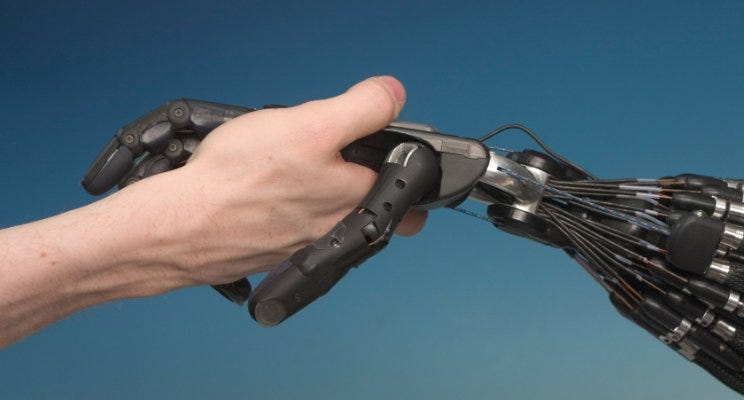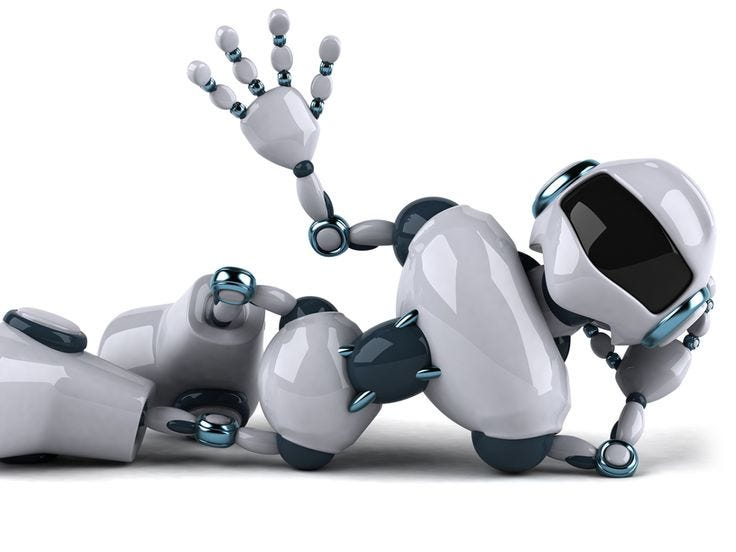
Frenemy — One who pretends to be a friend but is actually an enemy
Frenem-Ai — Ai who helps us in the short term, but may replace us in the long term
Why the squiggly lines?

You know when you try to access a site and you have to verify that you are a human by identifying squiggly or obscured numbers and/or text? That is a test called CAPTCHA (Completely Automated Public Turing Test to Tell Humans and Computers Apart). (CAPTCHA is better eh?)
Luis von Ahn, founder or reCAPTCHA (and DuoLingo) is a pioneer of crowdsourcing. Von Ahn saw simple CAPTCHA as a missed opportunity and developed reCAPTCHA to minimize waste while people identified numbers and text. Von Ahn developed a system to digitise books that were much too illegible to be scanned by computers.
Now everytime we verify we are humans by using reCAPTCHA, we are helping technology to digitise (and learn) text. You will agree this beats the heck out of a department full of recent graduates typing up book after book. It beats it on cost, it bests it on efficiency and it beats it on accuracy. reCAPTCHA has been so effective (it was acquired by Google) that it has completely digitised the archives of The New York Times and Google books and much more besides.
Digging our own graves?
Low skilled labour will be the first impacted by artificial intelligent automation. Undoubtedly one of the most convenient things to happen the taxi industry has been mobile applications. It is great for the user and for the driver it adds a layer of security. Some older drivers I met will only use the various apps because the user is rated, identified and identifiable. However, every time a taxi driver uses the app they are training the system that will eventually replace them.
Google maps is fantastic as a general mapping product, but using Google maps to understand how a city “moves” is slightly different.
Uber have realised that using Google maps was great to get Uber up and running. However, Uber was essentially “outsourcing” their opportunity to create, hone and train a system that could eventually be more valuable than the revenue share of each taxi fare that runs through their system.
Hence, Uber have invested half a billion dollars in developing their own mapping system. Now when a driver (and passenger) uses the Uber app they are training a mobility system that can be used and sold as a best-in-class mobility and logistics tool, where are the best places to park, where are the loading bays, where are the best pick-up points. This could be the oil in the Uber business model when we start looking at future forms of transport and mobility.
(This is akin to what marketers did by outsourcing digital to agencies as covered in a previous Thursday Thought: Chief Meaning Officer.)
Outsourcing our Futures?
“They still think they are in charge, but they aren’t. They have outsourced their brains without realizing it. Which is a sad thing.” — Clayton Christensen
Harvard professor Clayton Christensen often tells the story of how Dell Computers progressively outsourced elements of its PC manufacturing to the Taiwan firm ASUSTek. In pursuit of a better margins Dell outsourced the motherboard, the computer assembly, and the supply chain management. Dell even outsourced the design of the computer.
Dell was left simply marketing the product, which it no longer produced. Meanwhile, like machine learning, like digital agencies (which learned the tasks traditional marketers should have learned) ASUSTek learned the entire PC manufacturing process. In the end, why did ASUSTek need Dell? Why not sell their own brand version of the PC at a much lower cost? That is exactly what ASUSTek now do.
On this week’s innovation show CoderDojo founder and general partner with SOS ventures Bill Liao tells us that this is the most disappointing thing he hears from startups. They pitch the best team in the world, great, dynamic CEO, killer marketing team and a rainmaking sales team, then they announce that they outsource product development to an Indian firm, which they often know very little about. Bill sees this just like a Michelin star restaurant with a best-in-class sommelier, chef and waiting staff outsourcing meals to McDonalds.
Captcha, Gotcha, Seeya!

John Markroff author of ‘Machines of Loving Grace’ tells us that up until 2015 technology had created more jobs than it had replaced. A report released by the White House last October (2106) said that yes Ai will replace some jobs, but it will create many others.
I feel this is because in the past (and today) it was replacing manual, low skilled labour. Now that technology has advanced so far and advancements in neural networks and machine learning are so vast technology is now encroaching on “thinking” roles.
This shift seems inevitable, but leaves so many Elephants in the Room that very few seem to be addressing. What happens the increasing populations? Is econonic singularity a real threat? Is universal basic income the answer? Who monitors the Ai power shift and responsibility? Are governments equipped to answer these questions? Are we just waiting to see what will happen?
The best of both worlds…for now = Frenem-Ais
In the meantime, all we can really do is embrace technology and let it enhance our current roles. The “new time” that technology may enable should be used to upskill, read and learn, because standing still is sure to end badly.
Embracing technologies and cooperating with Ai has seen great results. In the White House report referenced earlier, it is argued pairing machines and humans can compensate for the weaknesses each has. For example, when given an image of lymph node cell to detect cancer, Ai results in a 7.5% error rate when working alone. There is a 3.5 % error rate in the human only approach. When combined as frenem-Ais, with AI and human as partners the error rate reduces to a mere 0.5%.
Unemployment rates are lowering for now. We need more people to build, design and train machines. Ai, AR, VR, MR and technology will all need a new workforce to build them, but Ai and machine learning is not even an embryo in its life cycle, it is but a twinkle in the eye. When making decisions today we should understand the possibilities of tomorrow.
**********************************************************************
On this week’s Innovation Show we speak to Bill Liao, Co-Founder of CoderDojo and General Partner of SOS Ventures. Bill tells us of his journey in entrpreneurship and his latest focus on the RebelBio Biotech lab in Cork. We talk CoderDojo, Leadership, Education, BioTech, Ai, Singularity and much more.
We also have a chat with Nils Rehmann, CEO and Founder of Canuevo, a Cannabinoid Pharma approach to healthcare. Nils team has a unique approach to accessing Cannabis for health for Epilepsy, Insomnia and Pain relief.
The show is broadcast on RTÉ Radio 1 extra 3 times weekly and on iTunes, TuneIn and and Google play. Website is here and below is Soundcloud.